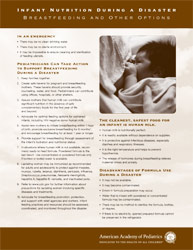- Perinatal Program Home
- News and Events
- Annual Progress Report
- Breastfeeding
- Alabama Maternal Mortality Review Program
- Fetal and Infant Mortality Review
- Infant Mortality
- Perinatal Partners
- Perinatal Regionalization
- Physician Information
- Pregnancy Resources
- Preparing for Disaster
- Regions and Coordinators
- Related Links
- RPAC Members
- Safe Sleep
- Alabama Cribs for Kids
- SPAC Members
- State of Alabama Infant Mortality Reduction Plan
- Contact Us
Preparing for Disaster
When disaster strikes, if you're not able to evacuate, make sure you and your family have a plan in place to ensure your safety. A well-thought-out plan can make all the difference. If you are pregnant or have just had your baby, it is important to speak with your doctor about what to do during an emergency or disaster. This site contains information to keep your unborn and newborn safe.
- Develop an emergency plan for your family.
- Seek your doctor's advice in developing your plan if you are late in pregnancy or have any complications.
- Plan to stay with family, friends, or a motel in a safe location further inland.
- If you have no other place to go, talk with your doctor about recommended safe places.
- Make a list of emergency health information for you and your family, and get a copy of your prenatal records and your child's shot record after each doctor visit.
- Tell your doctor and someone outside of the storm area where you and your family will be during a disaster.
- Be familiar with your insurance company's regulations regarding prior authorization or prior approval, etc.
Infant Nutrition During a Disaster: Breastfeeding and Other Options
Please view and/or print our Infant Nutrition During a Disaster brochure.
Emergency Risk Classification System for Physicians
The Emergency Risk Classification System has been developed in order for obstetricians to give their patients the best information available regarding where to go in case of a hurricane or other disaster. Go to the Emergency Risk Classification System for Physicians page to learn more and to download a print version of the information.
Disaster Preparedness Kit
Basics
- Clean towels
- Waterproof pads
- Medium-sized bowl (for collecting the placenta)
- Disposable gloves
For Baby
- Breast pump and supplies
- Newborn cap
- Case of diapers
- Hot water bottle (for warmth)
- Suction bulb
- Receiving blankets
For Mom
- Cold packs
- Acetaminophen
- Sanitary pads
Cutting Umbilical Cord
- White shoelaces or cord clamps for tying off the umbilical cord
- Sharp, clean scissors or unused razor blade for cutting the umbilical cord
- Alcohol wipes for cleaning tools
After the Birth
- Baby sling
- Mother's milk-it's the best food for babies in an emergency
For Your Emotional Health
The Disaster Distress Helpline, operated by the Substance Abuse and Mental Health Services Administration (SAMHSA), provides crisis counseling and support to people experiencing emotional distress related to any natural or human-caused disaster. The service is toll-free, multilingual, and confidential, and is available to all residents in the United States and its territories. Call 1-800-985-5990 or text TalkWithUs to 66746 to connect with a trained crisis counselor. Visit the SAMHSA website (httsp;//www.samhsa.gov/find-help/disaster-distress-helpline) for more information about services.
Numbers to Know
Emergency: 911
Provides emergency preparedness information in most major Alabama cities and surrounding counties: 211
Alabama Power Company: 1-800-888-2726
Alabama Road Conditions: 1-888-588-2848
Alabama Rural Electric Cooperative: 1-800-410-2732
CDC Emergency Response: 1-800-CDC-INFO (1-800-232-4636)
FEMA: 1-800-621-FEMA/TTY 1-800-462-7585
Alabama Poison Center: 1-800-462-0800
U.S. Fish and Wildlife Service: 1-800-344-9453
Hearing and Visual Assistance
Alabama Department of Rehabilitation Services
1-800-441-7607
1-334-281-8780
Alabama Institute for Deaf and Blind
1-256-761-3206
For further information on preparing for an emergency, visit the ADPH Center for Emergency Preparedness.
Page last updated: October 20, 2023





